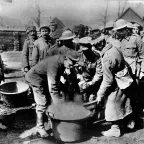Democratic Republic of the Congo: The survivors
Decades of fighting in eastern DRC have had horrific consequences, including the widespread rape of women, men and children. Every year, the obstetric unit of Panzi Hospital, Bukavu, treats hundreds …
Decades of fighting in eastern DRC have had horrific consequences, including the widespread rape of women, men and children. Every year, the obstetric unit of Panzi Hospital, Bukavu, treats hundreds …

Decades of fighting in eastern DRC have had horrific consequences, including the widespread rape of women, men and children. Every year, the obstetric unit of Panzi Hospital, Bukavu, treats hundreds …
Germany, First World War. British prisoners of war in a camp – time for soup. In August 1914, the ICRC set up the International Prisoner of War Agency in Geneva to centralize information management …

Second Meeting of States on Strengthening Compliance with International Humanitarian Law (IHL) June 17/18, 2013 Geneva Background Document May 2013 Contents 1. Introduction …
Water in rural areas is often scarce, poor in quality and difficult to collect, especially during a conflict. This year, we’re marking the 30th anniversary of the ICRC’s Water and Habitat Unit . …
The Arms Trade Treaty is a historic response to the human suffering caused by the widespread availability of weapons both during and after armed conflicts. For the first time ever in an international …

2nd Discussion on Strengthening Compliance with International Humanitarian Law (IHL) Functions of a possible IHL compliance system and their features 8–9 April 2013 Background document Geneva, March …
1914-1918 war. Near the front, in a Hungarian Red Cross ambulance car, the wounded are taken in and given first aid before being evacuated. © ICRC Photo Library / hist-e-00402 Famine in Russia, …
Try one of the following resources:
Created in 1863, the ICRC library, alongside the ICRC archives, provides an indispensable documentary reference on the organization itself and international humanitarian law.
International humanitarian law is based on a number of treaties, in particular the Geneva Conventions of 1949 and their Additional Protocols, and a series of other instruments.
Customary international humanitarian law consists of rules that come from "a general practice accepted as law" and that exist independent of treaty law.